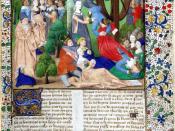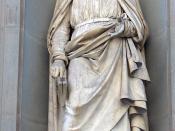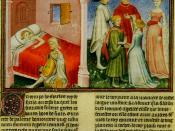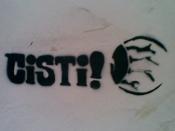The declared focus of Day Six is the utilization of language. The significance of the aforementioned theme is so great that I've opted to expound upon it further by discussing the first two tales. The tales of the sixth day gravitate around the concept of literary taste and literature as part of human leisure.
As we encounter the characters of this day we never stray more than twenty miles from Florence. In addition, all the narratives are set in the recent past and the majority feature protagonists who are well-known to the brigata and to Boccaccio's first audience.
The theme chosen to mark this Florentine homecoming is the exercise of language under pressure: the exchange of "like for Like" by those provoked by some verbal pleasantry or the utilization of a prompt retort or shrewd manuevre by those seeking to avoid "danger, discomfort, or ridicule."l Such adroit use of language was essential for the well-being of the Florentine Republic, " a regime which took pride in its associative or laterally extending forms of polity {as opposed to the unitary, downward=descending model of pwer ruled over by despots and tyrannical signori elsewhere in Italy.}2
Particular attention is paid to the varying ways in which individuals work together as a group in pursuit of common interests: a more intensive analysis of the internal dynamics of Boccaccio's brigata is included. Moreover, Day Six examines ways in which a brigata may be exploited for selfish motives and how group or social pressures may oppress a person. It is also the only day that commences with a picture of the group discussing and laughing at the stories, and this shift is reinforced almost immediately by the episode of the servants' quarrel.
The circle of storytellers is suddenly distracted by "a great commotion, issuing from the kitchen, among the maids and men-servants."3 Licisca and Tindaro have been arguing as to whether or not Sicofante's wife was a virgin on her wedding night. Tindaro's endeavors to speak are abruptly cut short by Licisca who vehemently denounces the foolishness of men who believe young girls will remain sexually inactive until they are married off.
Elissa, Quen for Day Six, is unable to terminate this diatribe and calls upon Dioneo, the storyteller, who ironically stands outside of any law to act as judge in this debate. Dineo rules in favore of Licisca that women are not so foolish as to waste opportunities while waiting for fathers and brothers to marry them off. Dioneo's 'sentenzia" effectively acknowledges his own "carpe diem" ethics. His decision also pokes fun at the legal procedure which the text deploys in that it sanctions the reality of sexual icense, not laws, between men and women. Discovering Dioneo on the side of transgression is not surprising.
This minor rebellion has long-term effects upon the Decameron's storytelling. Licisca asserts: "I could tell you a thing or two about the tricks they play on their husbands."4 Dioneo adopts this suggestion on Day Seven when he is crowned King. In addition, the brigata will draw much of its storytelling material from the lower order of society inthe second half of this book.
licisca's unceremonious interruption of Tindaro, "See here, you beast of a man,. how dare you speak before I do when you see me standing right here before you! Let me talk." 5 forms something of a counter-exemplum to the first novella.
This tale commences with a group of knights and ladies, reminiscent of Boccaccio's brigata, strolling throught the Florentine countryside. A knighjt offers to entertain Madonna Oretta with what he declares will be a most beautiful story and which, "will make a good part of our journey as eay for you as if you were riding a horse."6 Hoiwever, he makes such an excruciating mess of it, that Madonna Oretta sweats. feels faint, and ultimately thinks she's going to die. His redundance is manifest as he repeats prhrases and incidents. Moreover, he muddles his characters, apologizes for his mistakes in midtale, and posesses absolutely no sense of style or decorum.
Madonna Oretta is confronted with the dilemma of causing a courteous imposition of silence. This problem is not one of social class, rather of gender. A coman can't cut short a knight's lengthly and inept narrative without cutting a his exercise of manhood. Men were reputed to possess prowess at the lengthly discourse.
Oretta displays great ingenuity by developing and appearing to complete the logic of the man 's own horseback metaphor: "Sir this horse of yours has too rough a trot, so I beg you please, to se me down."7 Fortunately, the knight was better at taking a hint than at telling stories. Comprehending her wiity remark, he took it in a joking spirit and began to chat of other things.
According to David Wallace, Oretta's need to silence a deficient speaker arises from acute physical distress rather than sheer boredom. He asserts, " Competent storytelling was thought to exercise a vital hygienic functyion in pruging social malaise: incompetence mith help incubate the disease."8 Later in the day the brigata is actually subjected to an incompetent novella by one of its own members. In her tale, Emilia replicated many of the errors attributed to the incomptetnt knight as a result of her daydreaming and not focusing on the task of storytelling.
this novella mirrors Boccaccio's conscious utilization of discourse. He was fully cognizant of the power of the word and used it deliberately and sapiently. The vehicle he chose for the protagonists learning experience is the story. They learn about their world by telling and listening to sories many of which emphasize storytelling as a medium.
The second novella commences with Pampinea querying the wisdom of fortune and nature: Fair ladies, I myself am unable to decide which of the two is more a fault: Nature when she joins a noble spirit to an inferior body, or Fortune when she provides a body endowed with a noble spirit with an inferi9or occupation, as happened in the case of Cisti....a man endowed with the noblest of spirits, Fortune made into a baker.9 However, Pampinea insists that the temptation to curse Fortune and Nature should be resisted, since both of these powers display great wisdom in "burying their most precious possessions in the least imposing and therefore the least suspect part of their houses, whence they bring them forth in the hour of greatest need."l0 According to Wallace, this is an endeavor "to develop the notion of an intellignece buried deep within the Florentine body politic that will make itslef heard in time of danger."ll In Paminea's novella this intelligence is embodied by the unlikely figure of Cisti, the baker.
This novella is set in l300, the year in which the papal delegation of Boniface visited Florence in an endeavor to make peace between the two feuding factions: the Blacks and the White Guelfs. Assuming the role of peacemakers, these representatives were striving to bring the pro-papal Blacks to power by exterminating the Whitesl This is "the hour of greatest need" as Cisti watches the papal ambassadors criss-rossing the city accompanied by a prominent Florentine politician, Messer Geri Spina.(husband of Greta) As Wallace asserts, "Cisti needs to communicate with Messer Geri : he must make the Florentine leader recognize the character of his fellow citizens rather than devoting all his attention to the agenda of the pope. At the same time, Cisti is mindful of the difference in rank between himself and Messer Geri that makes such communication a delicate matter."l2 Like Madonna Oretta, Cisti displays extrordinary ingenuity in devising a set of strategies which enable him to communicate with Messer Geri as well as creating an enduring friendship. All the while, he insists upon the "punctilious observation of social differences."l5 In the tale of Cisti, language is endowed with efficacy to redeem Cisti in the sociual hierarchy in the sense that the language he utilizes with Messer Geri levels the social differences between them.
Boccaccio set out to teach his ten protagonists a good set of values that would enable them to preserve the old values and function effectively as leaders of their world. These stories were meant to transmit messages. In the story of Cisti, we discern that even bakers can remind powerful and influential leaders of their good manners.
Boccaccio presented to us, as well as to the brigada, a set of values: and he underlined the need to preserve the old values which would enable us to function as leaders. However, he wrote a recipe that included the following ingredients: wit, intelligence, ingenuity, and the proper utilization of language, which, if adhered to strictly would enable us to escape and/or avoid ruin, ridicule, discomfort, and danger. When I finished reading the Decameron, I had to admit that Day Six was definitely my favorite.
E N D N O T E S I Boccaccio, Giovanni, The Decameron (New York: Penquin Books, l982) 377.
2 Wallace, David, Decameron (Cambridge: Cambridge UP, l99l) 69.
3 Boccaccio, Giovanni, The Decameron (New York: Penquin Books, l982) 379.
4 IBID. 379.
5 IBID. 38l.
6 IBID. 383.
7 IBIDl 384.
8 Wallace, David. Decameron. (Cambridge: Cambridge UP, l99l)70.
9 Boccaccio, Giovanni. The Decameron. (New York: Penquin Books, l992. ) 384.
l0 IBID. 385.
ll Wallace, David. Decameron (Cambridge: CambridgeUP, l99l) 7l.
l2 IBID. 7l.
W O R K S C I T E D Boccaccio, Giovanni. Decameron. Translated by Mark Muse and Perer Bondanlla.
New York: Penquin Books. l992.
Capporella, Caradina. The Boccaccio Novella: Creating and Waning of a Genre.
New York: Lang Publishing. l990.
Wallace, David. Decameron. Cambridge: Cambridge UP. l99l.





